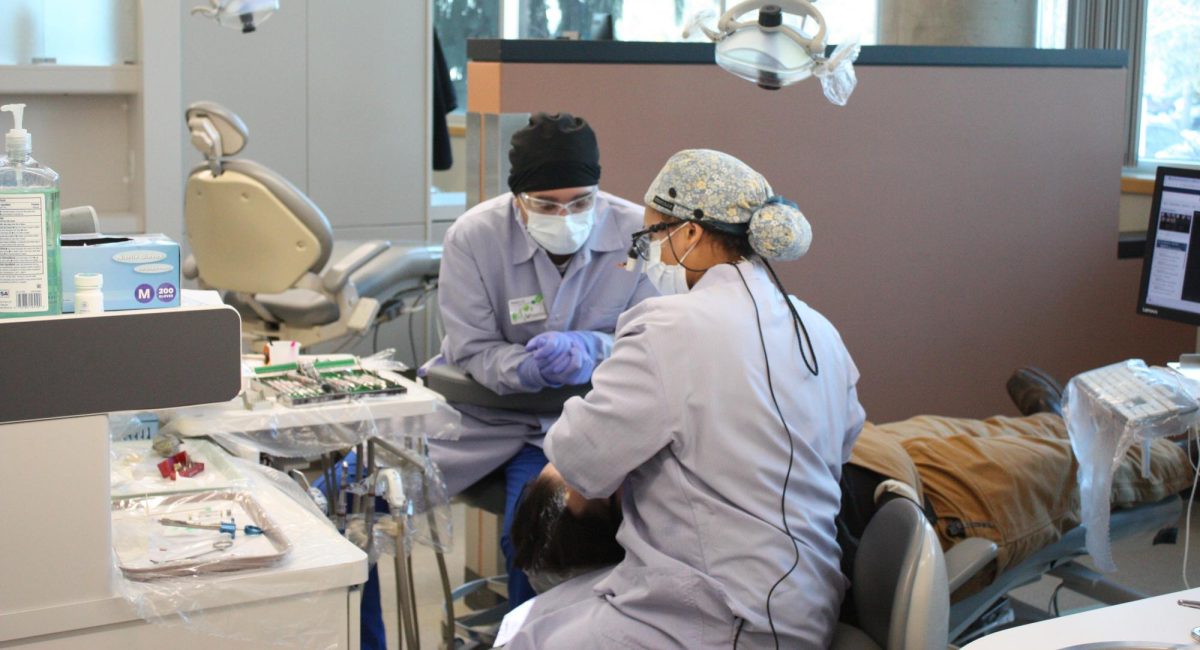Gun policy requires lock up

February 17, 2014
When Larissa Swift walked into the Eastern Washington University Police Red Barn her freshman year, she was carrying a shotgun.
“I got some pretty funny looks from the cops the first time I walked in there since I’m a girl,” said Swift.
Her shotgun was taken by the police. But it was not confiscated or illegal in any way.
In the Red Barn, located on Washington Street, just south of Roos field, it is not just the police who have guns. Actually, they are doing a job that most people on campus are not aware of. In their lockup, the police have guns that belong to students.
EWU policy prohibits guns on campus, but students are allowed to have two weapons checked into the police Red Barn. Once checked in, the students may check their guns out again. This allows police to know who has a gun and where they will be.
“There are probably about 15 different people who use the service to check in weapons,” said EWU Police Sgt. Lorraine Hill. “There are several that have hunting-type weapons. There are a few small arms, usually checked out to go to Sharp’s Shooting, go shoot and then come back.”
On a campus of over 12,000 people, 15 students with guns is a small number. Some of those 15 do not even use their guns once. “Some of them just check it in at the beginning of the year, and check it out at the end of the year,” said Hill.
Swift, now a sophomore, said she kept her shotgun and bow there while she lived on campus. She said she loved it since there was nowhere else to keep them. “Before long, the people there knew me by name since I checked my weapons out all the time,” she said.
When asked, most students did not know much about the university gun policy except that guns are not allowed on campus. Some found it unnerving that students could check guns in and out.
“It makes me feel a little unsafe knowing students could check them out at any time and bring them on campus,” said Savannah Kohler, a junior at EWU. “This was definitely something I didn’t know students could do. I had no idea about it.”
Senior Tyler Nordlie says he owns a gun, but does not live on campus. He said he likes the rule though and thinks it is a reasonable measure to take.
If he did live on campus, Nordlie said he would not mind checking his weapon in. “It’s kind of a hassle. An extra step, but it’s better than nothing,” Nordlie said. “I feel like without it, people may try to hide their guns.”
Hill said students are really good with following policy but addressed both of these concerns. The program is all about safety, and the campus police are here to make sure the procedures are followed.
When a student brings a weapon in, it has to be unloaded. Ammunition cannot be stored in the gun lockup. The campus police request that weapons are in a case when brought through the door. “It would be kind of bad if they didn’t have it in a case and were walking around the parking lot,” Hill said.
“If it’s the first time that they check it in, we verify everything. We take their driver’s license and do a records check. We make sure they don’t have any mental health issues, no record of domestic violence or prior arrests in which they couldn’t have the weapon,” Hill said. “We fill out the forms, then actually check the weapon in.”
“It was really easy,” said junior David Lorton. “I just filled out a sheet of paper with all my information and whatnot, as well as what kind of guns they are. I have a rifle and a shotgun in there. It’s nice for me because I live in the dorms, where, obviously, you can’t have guns.”
Hill said all students are also briefed on the check-out procedure.
“When they come in initially, we make sure they are doing things properly,” Hill said. “If you do have a weapon, and it’s stored properly, and you get stopped by a police officer, make sure that you keep your hands where they can be seen at all times and tell the officer that you do have a weapon in your vehicle. Say ‘I have it safely secured in my vehicle,’ then the officer can do what they need to do.”
Hill said, if the campus police hear that a student has a weapon in their residence hall room, in their vehicle or stored improperly, they address it immediately. “It’s very possible for someone to have an illegal weapon in their rooms,” Hill said. “If they have their weapon in their room, we explain the procedure to them. If there was a charge that needed to happen, of course we would charge them.”
Although these precautions are in place, EWU is not without incident. According to the EWU Annual Safety and Fire report, there have been seven referrals and one arrest for illegal weapons possession on campus within the last three years.
Hill knows it is not fun facing someone with a gun.
“It’s pretty scary,” she said. “We have several calls within a school year that refer to a weapon of some sort. We have had students on the Internet, on Facebook doing videos of themselves holding a weapon. When that was brought to our attention, we pulled the person out of class, went to their room, had a search warrant in hand, searched the room and it was clearly an Airsoft weapon.
“But we didn’t know that to begin with. All we saw was a weapon. If someone draws down on you with that, we have no idea whether it’s real or not real; the potential to be in an officer-involved shooting is there. It’s just not a good idea,” said Hill.
Hill said that even officers from other departments have broken the gun policy while taking classes at Eastern. “If someone happens to see the gun on their hip, and they are taking classes-they’re supposed to come in and advise us, that way we know for a fact that is what it is, and not just someone running around campus with a gun.”
The campus police take any threat very seriously. “People have come in here for other people’s Facebook posts, and we have pulled people out of class for that. Even if someone makes a post saying that they’re mad, and they’re going to ‘pull a Columbine’ on somebody, we’re pulling that person out of a class. It’s very serious, and, if they live on campus, we make sure that they do not have any weapons,” said Hill.
Hill said that the students using the Red Barn gun check-in have a good record of following the policy. They are generally members of the many clubs and organizations on campus who use real guns, Airsoft guns and even replica guns for outdoor recreation, hunting and shooting sports like trap and skeet.
Nick Barr, president of the EWU Sportsman Club, says he makes sure that the members of his club know about the campus gun policy and comply with it. The club takes shooting sports very seriously and cannot afford to break the rules.
“We just started a trap and skeet team and hope to send five to 10 members to regionals for the Collegiate Northwest Trap championship in May. We have applied for two or three grants for funding, ” Barr said. “Everyone in our club is aware of the rules and regulations at school.”
Barr said, even though he has never lived on campus and has not had to check any of his weapons in, other members of his club, including Swift and Lorton, have. Lorton said he learned about the policy from being in the Sportsman Club.
“No one has said anything bad,” said Barr.
Maj. (Ret) Rob H. Reidel, assistant professor and enrollment officer in EWU’s department of military science, makes sure that the Eastern ROTC Fighting Eagle Battalion follows the rules on weapons at all times.
The ROTC does most of its on-campus drills away from students, even though they do not use real guns.
“The weapons we use on campus are dummy weapons,” said Reidel. “They look like guns, but they are rubber replications. When we use those, we contact the campus police, so that they’re able to know if there is a call, that they see someone with a weapon, where we’re training, what we are doing, how many students, what type of training we’re doing. If they get any calls, they’re prepared to say, ‘Hey it’s just ROTC, and they have permission to do that on campus.’
“The campus police policy is for us to contact them,” Reidel said. “If we were out training, and we had not informed them and then they got a call, I mean, they could shut us down.”
Reidel said that any training done with real weapons is coordinated with Riverside State Park in an area owned by the Washington National Guard. The weapons are stored at Fairchild Air Force base, along with blank rounds made available for ROTC training.
Knowing the gun policy of your university can save a lot of trouble.
Last year when two Gonzaga University seniors, Erik Fagan and Daniel McIntosh, used a gun to scare off a possible intruder, they claimed they were unaware that they were breaking GU policy.
Like Eastern, Gonzaga prohibits students from having guns on campus or in any university-owned building. Fagan and McIntosh lived in apartments owned by the university even though they are considered to be off campus.
The pair were placed on academic probation after they were found in violation of the school’s weapons policy.
If a similar incident to the one at Gonzaga took place at Eastern, Hill said the results would probably be the same. “Any time that an issue occurs, there is always a university disciplinary process that they would go through. That would be a weapons policy issue.”
Swift said she had no problem checking in her weapons. As a Sportsman Club member, It allowed her to keep doing what she loves while she lived on campus: hunting, shooting, fishing and everything outdoors.
“Only bad thing is it can take awhile to check them back in,” said Swift. “I’ve sat outside for an hour before waiting, but to me it’s still worth it.”
From her office in the Red Barn, Hill gives a stern but friendly reminder to students to be mindful of what they are doing with guns. “You can potentially hurt yourself or someone else having a weapon on campus,” Hill said. “It’s all about campus safety.”








